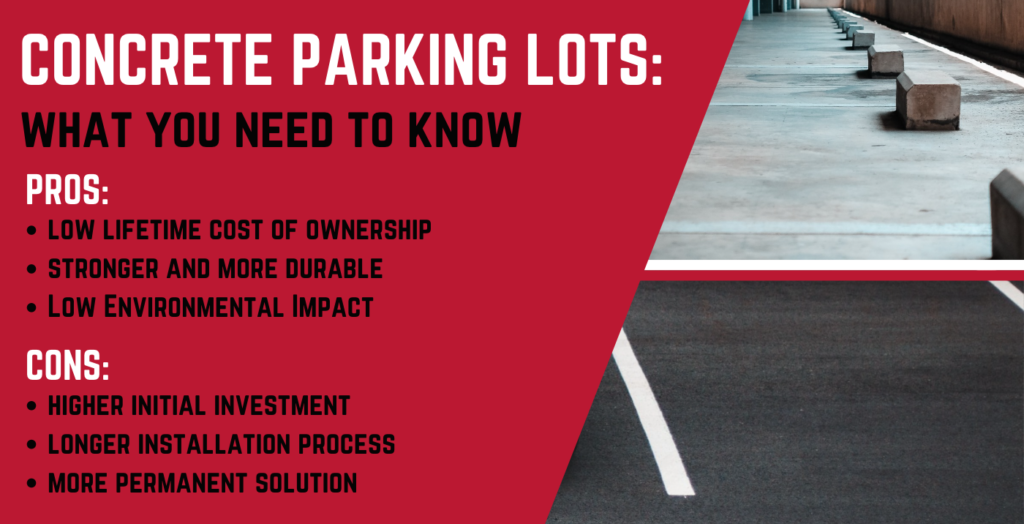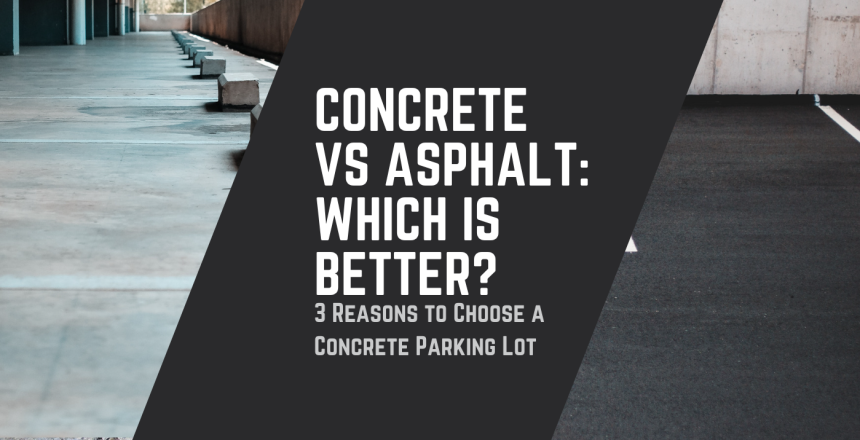Your parking lot is the first impression you can make on your customers. So what’s your best option for revamping your tired parking area: an asphalt parking lot or a concrete parking lot?
Before you start paving away, here are some important facts to keep in mind when you decide how to invest in this critical part of your storefront.
How Are Concrete and Asphalt Different?
Concrete and asphalt both provide the same basic functionality (a safe place for your customers or employees to park). But the materials themselves contrast each other in many ways. The first is the basic components.
Concrete is made up of coarse and fine aggregates, water, and Portland cement. The cement is the active ingredient, creating crystalline structures within the aggregate as it hydrates and then cures. The result is a rigid, somewhat porous material that can withstand extremely heavy loads without damage.
Asphalt is petroleum-based, utilizing liquid asphalt as its glue. Along with course and fine aggregates, the asphalt is mixed together at high temperatures before it is poured and smoothed out. Once cool, the asphalt surface is ready to use.
3 Advantages of Concrete Parking Lots
The differences in the materials and processes used for concrete and asphalt paving hold the key to some of concrete’s biggest advantages over asphalt. There are three key advantages: lifetime cost, strength, and environmental impact. Here’s our rundown of each.
1: Lifetime Cost of Ownership
Concrete’s lifespan is anywhere from 20 to 40 years of use, about twice the life expectancy of asphalt. And when maintenance is factored into the equation, the cost disparity grows even greater.
2: Strength and Durability
A concrete parking lot can withstand heavy loads and high traffic with ease. Its higher compressive strength makes it perfect for parking lots that anticipate heavy machinery or constant traffic. Asphalt pavement requires almost twice the thickness of concrete for the same strength, making it far less cost-effective than it might seem at first.
Meanwhile, it handles freeze-thaw cycles better than asphalt, reducing the chances of your parking lot developing potholes. Asphalt is notorious for developing deep holes from weathering, and those holes often require repair multiple times per season. Concrete, while it can crack from freeze-thaw cycles, requires far less patching each season.
3: Environmental Impact
The environmental impact of concrete is far smaller than that of asphalt. Concrete construction requires one-fifth the diesel fuel of asphalt construction, making it a far greener option than asphalt. But it’s more than fuel that makes concrete a green option.
- 100% recyclable
- Mineral-based composition, not petroleum
- Reflects light and heat, reducing cooling costs in nearby buildings
- Reduced maintenance = reduced fuel consumption for machinery
- Safer for wet or cold weather
- Better visibility at night for safer conditions

Drawbacks of Concrete Parking Lots
But even with these advantages, concrete might not be your ideal solution. Here are some of the objections we see when deciding between asphalt and concrete parking lots.
1: Initial Investment
Asphalt, to put it as simply as possible, is just less expensive than concrete pound-for-pound. Because of this cost difference, budget-minded businesses often choose the less expensive option in order to maintain tight cost requirements.
But it’s often only a short-term solution since asphalt typically needs to be replaced in half the time of concrete. Add in maintenance costs, and it’s clear that asphalt is only a smart choice if you simply can’t spare the capital for a more dependable solution.
2: Installation Time
Concrete takes several days to install in many cases, especially when you include curb-and-gutter needs. But in addition, concrete parking lots require weeks to fully cure. The chemical reaction of Portland cement with water is critical, and it can be disturbed if conditions aren’t maintained properly.
Asphalt is typically a faster solution than concrete. Within about 3 days, most asphalt is ready for traffic. Final curing, though, can take anywhere from six months up to a year.
3: Permanent Solution
Concrete’s inherent durability is a benefit in most cases, but it can cause challenges when it comes to replacing a parking lot. Concrete requires complete tear-outs when it reaches the end of its lifespan.
For asphalt parking lots, you can often overlay old blacktop with a new layer, making replacement slightly less labor-intensive. That faster turnaround from start to finish is especially beneficial for businesses that have little to no option for temporary parking or loading.
Concrete Or Asphalt: What’s Better?
Like most major investments, your choice between concrete and asphalt depends largely on the needs of your business.
You’ll probably want to choose an asphalt parking lot if your business:
- Needs fast turnaround from start to finish
- Has minimal funds to invest
- And has light traffic and few trucks
But concrete is a better choice if your business:
- Wants minimal maintenance
- Prefers a longer-lasting solution
- And experiences heavy truck traffic on a regular basis
Concrete Parking Lots That Last
If you’re ready to install a concrete parking lot to get the most out of your investment and minimize maintenance costs, Brooks Construction is ready to make it happen. As the Local Best concrete construction winner in Sioux Falls and the surrounding areas since 2006, you can be confident that you’ll have a parking lot that can provide your business with a long-lasting and beautiful solution for years to come.
Contact us today to start your estimate and learn more about your options!



